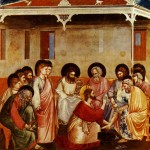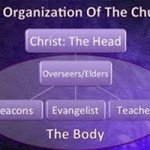Replay: Do not imitate evil but imitate good
Four and a half year ago, in March 2007, I published a post called “Imitate Good.” I had been working through John’s third letter, and this post was part of that “series,” which wasn’t really a series. The command in 3 John 1:11 – “Do not imitate evil but imitate good” – caught my attention, primarily because John was talking about the people that we allow to influence and lead us. And, in this letter, how does John distinguish between “evil” and “good”? Well, it’s not the way we usually see them defined…
————————————–
I’ve posted a few things recently from 3 John. I’ve enjoyed studying this short letter. Here is another passage that helps us understand what it means to make disciples and what it means to be a disciple. Consider what John says in verse 11:
Beloved, do not imitate evil but imitate good. Whoever does good is from God; whoever does evil has not seen God. (3 John 1:11 ESV)
Just before this, John had warned his readers that Diotrephes did not accept what John wrote, did not help the brothers and sisters who travelled through his area (see “Sending with hospitality…“), and “likes to put himself first”. John indicates that he plans to confront Diotrephes face to face about this (see “We will talk face-to-face…“).
In 3 John 1:12 and following, John encourages his readers to follow Demetrius instead. How do the readers know that they should follow Demetrius? Because Demetrius “has received a good testimony from everyone, and from the truth itself”. John adds his own recommendation as well.
Notice what John is saying here. There is one man who loves to be first – he loves being a leader. But, John says that his conduct is contrary to the ways of God. So, John does not want his readers to follow him. Instead, he points them to a man who is obediently following God. Everyone who knows him recognizes this. This is the “good” that John expects his readers to follow.
Do you want to know who to follow as a disciple? Then ask yourself these questions: Who has a good testimony? Who’s conduct matches their theology? Who lives what they teach and speak? Follow those people.
But, think about these questions: Who loves to be first, noticed, recognized, important? Who is more concerned with their position than with their conduct? Who is more concerned with whether or not other people are obeying him than whether or not he is obeying God? Do not follow those people.
John began this short letter by telling his readers, “I have no greater joy than to hear that my children are walking in the truth.” (3 John 1:4 ESV) Could it be that part of “walking in the truth” is knowing how to imitate good and those who are following God, and how to avoid imitating evil and those who are not following God?
The Downward Path of Jesus
Last week, when I spoke in Dave Black’s New Testament class on the book of Acts (see my notes and outline “The Church by Example in the Book of Acts“), the students had read and were discussion the book The Jesus Paradigm. As part of their assignment for the day, Dr. Black had asked them to write a reaction paper to this question (paraphrasing): “What is a radical Christian?”
At the beginning of the class, the students broke up into groups of four to read their papers to one another and to discuss the question. Later, Black asked four students to read their papers to the entire class. (By the way, this was not my assignment. It had been assigned by Dr. Black. But, I thoroughly enjoyed discussing the topic with four students and hearing several papers on the subject.)
When I began my lecture, I returned to that question: “What is a radical Christian?” I asked them to form an image of a “radical Christian” in their minds. Then, I asked them this question: “Would that ‘radical Christian’ seem normal or abnormal among the Christians that you gather with regularly, that is, among your church?” Almost the entire class said, “Abnormal.”
Then, as a follow-up, I asked this question, “Would you think that ‘radical Christian’ that you are imagining be normal or abnormal among the earliest Christians as described in the book of Acts?” Most of the students said, “Normal.” (I don’t remember anyone saying, “Abnormal,” but I didn’t take a poll.)
So, what has changed? Overall, our understanding of what it means to follow Christ (i.e., be a Christian) has changed. Primarily, it has changed from a way of life to professing a set of beliefs.
I suggested to the students that the term “radical Christian” should not be used to describe someone at a certain spiritual level. Instead, a Christian – a person following Christ – is simply someone who is continually being changed through the indwelling presence of the Holy Spirit such that that person’s life looks more and more like the life of Jesus Christ.
Dave Black’s book The Jesus Paradigm was originally titled The Downward Path of Jesus, and that’s exactly what a follower of Christ is. He or she is a person who is on the downward path away from self and toward Jesus Christ.
Maturity, then, is not a goal that we attain (with which most would agree, except for those who hold to perfectionism). Instead, maturity is a path or a way of life. It is continually submitting to the indwelling Holy Spirit, submitting plans, hopes, dreams, futures, retirement, education, vocation, thoughts, family, friends, travels, business, etc. etc. etc.
This is the downward path of Jesus – less of self, and more of Jesus. Those who are on that path are the true followers of Jesus, what today is unfortunately called “radical Christians.”
What is the Apostles’ Teaching?
On the day of Pentecost, the Spirit of God (Spirit of Jesus – Holy Spirit) indwelled 120 of Jesus’ followers as they were waiting for the “Promise of God” as Jesus had instructed them. The Holy Spirit was that Promise, and they all immediately began to proclaim the praises of God and the gospel of Jesus Christ. (Acts 2:1-4) After Peter’s proclamation (and, logistically, I’d argue it was after the proclamation of the other 119 also), 3000 people received that same promise, the Spirit of God. (Acts 2:41)
What follows is a beautiful of summary of the new (re-newed) life of that community in Christ. Their life included dedication to fellowship with God and one another, sharing meals together, praying together, sharing their possessions with anyone who was in need, and (apparently) proclaiming the gospel.
But, according to the very beginning of that summary description in Acts 2:42, their new life in Christ included something else: dedication/devotion to (or perseverance in) “the apostles’ teaching”:
And they devoted themselves to the apostles’ teaching and the fellowship, to the breaking of bread and the prayers. (Acts 2:42 ESV)
What does it mean that these 3120 (plus more added daily) “devoted themselves to the apostles’ teaching”?
To begin with, the verb “devoted themselves” (the ESV translators must have found the “themselves” in the verb) could also be translated “persisted in,” “busied themselves with,” or “persevered in.” The form of the verb makes it clear that this was an ongoing practice. (For those who understand grammar, this is a periphrastic participle.) So, it’s acceptable (and perhaps even closer) to translate this verb as “they kept on devoting themselves to…”
But, what was “the apostles’ teaching” that they were devoting themselves to? Well, “teaching” here is not a verb. It would be incorrect to think that Luke was painting a picture of those early Christians continually devoting themselves to listening to the apostles teach/preach. Instead, they kept on devoting themselves to WHAT the apostles were teaching.
What were the apostles teaching? If we conclude that the apostles were following Jesus’ instructions, then the apostles were teaching what Jesus had taught them. And, beyond teaching facts, the apostles were teaching people to DO everything that Jesus had told them to do. (For example, consider Matthew 28:19-20.)
Thus, being continually dedicated to what the apostles were teaching is tantamount to continually DOING everything that Jesus had taught the apostles to do while he was with them. (I believe that much of this teaching – and the most important of Jesus’ teachings – are included in the Gospels, and then explained or interpreted in the epistles in the contexts of each of those churches/recipients. And, of course, the most important thing – according to Jesus – is to love God with everything you have and to love your neighbor as yourself.)
The apostles’ teaching has just as much to do with a way of living as things to believe. This is easily verified by checking the statements of Jesus in the Gospels. Furthermore, we can see what Paul understood as “doctrine” or “teaching” (the words are the same) in Titus 2:1-15.
So, what does it mean that those early believers “devoted themselves to the apostles’ teaching”? It means that they were continually persisting in doing everything that Jesus had taught the apostles (and them) to do.
(P.S. I am happy to see that another blogger is discussing this same topic. See Josh’s post “The apostles’ teaching.”)
Addendum on authority: The most pervasive argument against positional authority among the church
Last week I published a five-part series on authority among the church. (Read the “Introduction” post here, and links to the other posts can be found at the bottom of each post in the series.)
In the series, I began my discussion with Jesus’ statements to his apostles concerning positional authority. Then, I showed that leaders in Scripture were not told to lead by authority but to lead by the example of their lives. Next, I said that the appointment of elders was not to a position of authority, but as recognition of their maturity in their walk with Christ. Finally, I argued that shepherding and overseeing do not indicate positional authority because the “troubling” parts of admonishing, correcting, rebuking, etc. are actually the responsibility of all believers.
Now, I think the scriptural evidence that I presented in that series is pretty strong. However, believe it or not, I do not think that is the strongest evidence against positional authority in Scripture. In fact, I believe there is another type of evidence that is even stronger against positional authority and is pervasive, being found throughout the New Testament.
However, you cannot find this evidence by quoting chapter and verse. Instead, you must look at the New Testament books as a whole. When you examine each book, you find the evidence against positional authority.
What evidence am I talking about? Well, to begin with, almost all of the books are addressed to all the believers in a city or region (church or churches). Even those books that are addressed to individuals appear to be written with a group (church) in view.
For example, when Paul wrote to the church in Thessaloniki, he addressed several different problems in his two letters. But, he did not address the leaders in the church, although there were certainly leaders (1 Thessalonians 5:12-13). He addressed the whole church. He did not expect the leaders to exercise their authority in order to correct the problems. He expected the whole church (including the leaders) to work together to address the problems.
When Paul wrote to the churches in the region Galatia, he wrote about very severe problems. In fact, he had very strong words for these believers because they were walking away from the true gospel. Paul knew that there were both those who were “spiritual” (Galatians 6:1) and those who “taught” (Galatians 6:6) among the churches in Galatia. But, he did not appeal to them to exercise their authority to correct the problems. He expected all of the believers to work together to deal with these issues.
Paul had many great things to say about the church in Philippi. But, he was also concerned about some issues, including discord between two women who were part of the church. Once again, Paul did not appeal to the leaders, even though he knew there were both “overseers and deacons” among the church (Philippians 1:1). Instead, his letter appealed to the whole church to work together for gospel and for the unity of the church, including bringing together Euodia and Syntyche.
I could have started with the church in Corinth. There were so many problems among the believers in Corinth that it’s a wonder that Paul didn’t give up on them. But, once again, he did not appeal to their leaders to exercise their authority to correct very dangerous issues. Instead, he constantly appealed to all the believer to work together to correct the issues.
Even a personal letter like the one Paul wrote to Philemon was actually addressed to all the believers he met with (Philemon 1:1-2). Even 1 Timothy, 2 Timothy, and Titus seem to be intended for the church, not just for the individual addressed. (Consider Titus 2, for example.) The same arguments above could also be presented for James’, Peter’s, John’s, and Jude’s letters.
Perhaps the letter with the strongest argument against leaders exercising authority is the one in which we find a verse that seems (at the surface) to support the idea of positional authority: the Book of Hebrews. Hebrews 13:17 is often presented as the standard for leaders with authority over the church. However, this sentence is presented within the context of a letter in which all believers (not just the leaders) are instructed to “encourage one another daily” against the deceitfulness of sin (Hebrews 3:13), to “stir up love and good works” by encouraging one another (Hebrews 10:24-25), and strengthening one another by looking into one another lives for evidences of bitterness or immorality (Hebrews 12:12-17). Again, these exhortations/commands are given to the whole church, not to the leaders.
When the authors of Scripture wrote letters to address problems, they did not appeal to the leaders among those churches to use their authority to correct the problems. They addressed the entire church and expected the entire church to work together. Were there leaders among these churches? Yes. In some cases, it’s obvious that there were leaders, while in other cases it can be assumed.
But, in all cases, the authors did not expect these leaders to have any type of positional authority among the churches. To me, this is the most pervasive and strongest argument against leaders exercising authority among the church.
(Actually, there is one case in which an author of Scripture knew of a leader who was exercising positional authority. His name was Diotrephes, and John wrote about him in 3 John 1:9-11.)
———————————————-
“Authority Among the Church” Series
- Authority among the church? Starting a new series.
- What did Jesus say about positions of authority under his own authority?
- In the church, how does someone lead without exercising authority?
- Does the existence and recognition of elders indicate that they have positional authority?
- Does shepherding and overseeing suggest exercising authority?
Addendum: The most pervasive argument against positional authority among the church
Replay: Seeing your community through the “ideal” filter
Three years ago, I wrote a post called “Seeing your community through the ‘ideal’ filter.” The point of the post is that no group of believers – no church – is perfect. We can all learn from one another. But, we must be willing to humble ourselves and listen to those who are different from us.
———————————
Seeing your community through the “ideal” filter
Yesterday, I published a post called “Paul’s Vision for the Church“. In that post, I included this description of the church (from Andrew Chester, “The Pauline Communities”, in A Vision for the Church: Studies in Early Christian Ecclesiology. ed. Markus Bockmuehl and Michael B. Thompson, Edinburgh: T&T Clark, 1997):
Paul’s vision for the communities that he wrote to can be summed up quite succinctly. He sees them as being a new creation in Christ, filled with the Spirit, possessing gifts of the Spirit and overflowing with the fruit of the Spirit, controlled above all by love; they are communities that should be pure and holy, mutually supportive and interdependent, completely united, transcending the oppositions and tensions between different groups within the community, and with every kind of barrier that would divide them in normal society broken down. (105)
This is certainly an “ideal” image of the church. But, I suggested that all communities of believers should strive for this ideal – not from their own abilities and methods, but by humbly admitting that they are not perfect and allowing the Holy Spirit to change them as he desires.
But, it is very difficult to “see” ourselves as we really are. It is often of great benefit to see ourselves from the perspectives of someone else – especially if it is someone who cares about us.
I think that Guy Muse, from “The M Blog“, has provided this valuable service for “traditional churches” in a post that he called “Seeing legacy churches through simple church eyes“. Guy observes and offers suggestions concerning 1) the Sunday morning sermon, 2) the offering, 3) Sunday School, 4) singing and praise, and 5) prayer. Notice that Guy is simply critiquing “traditional churches” from an idealistic or academic perspective. He has been part of simple churches in Ecuador for years. He recognizes some benefits of the churches that he’s participated in and would like to see believers in “traditional churches” come to know these same benefits.
Are those of us who are part of “traditional churches” willing to consider the perspective of someone like Guy? Are we willing to admit that we are not perfect and that there are ways that we could – and should – change to better reflect who we are as the people of God both to one another and to the world around us?
Then again, are those of us who are part of “simple churches” willing to be examined by someone who is part of a “traditional church”? Would “simple church” adherents be willing to admit that they could learn from those who are part of “legacy churches” in order to change to better reflect who they are as the people of God both to one another to to the world around us?
We can learn from one another… but only if we are willing to humble ourselves, listen to one another, and change where we need to change. It begins by admitting that we are not perfect. Then, it continues when we admit that we can learn from someone or some community that is different than we are.
Are we that humble yet? Perhaps we can start by seriously considering Guy’s observations and suggestions.
Does shepherding and overseeing suggest exercising authority?
This is the fifth post in my series on “Authority among the church.” In the “Introduction” post, I simply laid out the series of questions and issues that I plan to cover in this series. In the second post, I pointed out that Jesus responded negatively when asked about “positions of authority under his own authority.” In the third post, I answered the question, “How does someone lead without exercising authority,” by stating that among the church people lead from the influence of the life as an example to others, not by positional authority. In the fourth post, I ask the question, “Does the existence and recognition of elders indicate that they have positional authority?”
To begin with, elders are instruct to shepherd (“pastor”) and oversee. We see this in Acts 20 and 1 Peter 5:
[To the elders from Ephesus] Pay careful attention to yourselves and to all the flock, in which the Holy Spirit has made you overseers, to care for the church of God, which he obtained with his own blood. (Acts 20:28 ESV)
So I exhort the elders among you, as a fellow elder and a witness of the sufferings of Christ, as well as a partaker in the glory that is going to be revealed: shepherd the flock of God that is among you, exercising oversight… (1 Peter 5:1-2 ESV)
“Shepherding” and “overseeing” including watching and caring, but these are not the functions that typically bring out the big authority guns. Instead, as is often pointed out, “shepherding” and “overseeing” also include the ideas of correcting, admonishing, and rebuking. The idea is that if someone can point out that someone else is wrong and then correct that person, then authority is exercised.
But, there is a basic problem with this idea: as we’ve seen many times, ALL believers are instructed to correct, rebuke, and admonish others. These types of functions are not limited to elders or other leaders.
I’ve already pointed out 1 Thessalonians 5:12, so I’m not going to list it here again (mouse over the reference to see the verse). But, there are other similar instruction given to all believers:
I myself am satisfied about you, my brothers, that you yourselves are full of goodness, filled with all knowledge and able to instruct [admonish] one another. (Romans 15:14 ESV)
Let the word of Christ dwell in you richly, teaching and admonishing one another in all wisdom… (Colossians 3:16 ESV)
I myself am satisfied about you, my brothers, that you yourselves are full of goodness, filled with all knowledge and able to instruct [admonish] one another. (2 Thessalonians 3:14-15 ESV)
The Book of Hebrews is filled with exhortations for all believers to look deeply into each others lives and to help and correct where needed. Here are a few examples:
But exhort one another every day, as long as it is called “today,” that none of you may be hardened by the deceitfulness of sin. (Hebrews 3:13 ESV)
And let us consider [one another] how to stir up one another to love and good works, 25 not neglecting to meet together, as is the habit of some, but encouraging one another, and all the more as you see the Day drawing near. (Hebrews 10:24-25 ESV)
Therefore lift your drooping hands and strengthen your weak knees, and make straight paths for your feet, so that what is lame may not be put out of joint but rather be healed. Strive for peace with everyone, and for the holiness without which no one will see the Lord. See to it [this is actually the verb “oversee”] that no one fails to obtain the grace of God; that no “root of bitterness” springs up and causes trouble, and by it many become defiled; that no one is sexually immoral or unholy… (Hebrews 12:12-16 ESV)
Remember that the Book of Hebrews includes two passages that are usually presented as indicative of the authority of leaders: Hebrews 13:7 and Hebrews 13:17. But these passages MUST be interpret within the context of what the author has already said to the whole church.
In fact, this is the point of this whole post. While elders/leaders are told to admonish others, all believers are told to admonish others. While elders/leaders are instructed to look into the lives of others, all believers are instructed to look into the lives of others. While elders/leaders are urged to correct sinning believers, all believers are urged to correct sinning believers.
Thus, the functions of admonishing, correcting, and rebuking (as part of shepherding and overseeing) cannot give special authority to elders/leaders, since ALL believers are supposed to carry out these same functions.
(As an addendum, Hebrews 13:17 says that leaders will give an account for the way they care for others. Of course, this is true for ALL believers as well. In other words, the answer to God’s question to Cain in Genesis 4:9 is, “Yes! You are your brothers’ and sisters’ keeper!” All believers, including leaders, will give an account to God for how we care for our brothers and sisters, which includes teaching, correcting, rebuking, and admonishing.)
———————————————-
“Authority Among the Church” Series
- Authority among the church? Starting a new series.
- What did Jesus say about positions of authority under his own authority?
- In the church, how does someone lead without exercising authority?
- Does the existence and recognition of elders indicate that they have positional authority?
- Does shepherding and overseeing suggest exercising authority?
Addendum: The most pervasive argument against positional authority among the church
Does the existence and recognition of elders indicate that they have positional authority?
This is the fourth post in my series on “Authority among the church.” In the “Introduction” post, I simply laid out the series of questions and issues that I plan to cover in this series. In the second post, I pointed out that Jesus responded negatively when asked about “positions of authority under his own authority.” In the third post, I answered the question, “How does someone lead without exercising authority,” by stating that among the church people lead from the influence of the life as an example to others, not by positional authority.
In Scripture, we see elders recognized/appointed among the church several times. Paul and Barnabas recognize/appoint elders when they were traveling back home on their first missionary journey (Acts 14:23). There were elders among the church in Ephesus when Paul was returning to Jerusalem for the last time (Acts 20:17). Paul included the overseers among those he addressed in his letter to the church in Philippi (Philippians 1:1). (Yes, I’m using the terms elders and overseers interchangeably.) Paul told both Timothy and Titus how to recognize who was qualified to be elders/overseers (1 Timothy 3:1-7 and Titus 1:5-9). Peter and James talked about the elders among the scattered churches that they addressed (1 Peter 5:1-3 and James 5:14).
Doesn’t the recognition/appointing of elders indicate that these people had positional authority among the church?
No. To put it simply, elders (and other leaders) are always addressed as being among the church, and never over the church. Thus, they are not positional separate from the church, but are mature people who live in a way that makes them an example to others.
Two of the passages involved are usually thought to indicate that elders (or leaders) have some type of positional authority: 1 Thessalonians 5: 12 and 1 Timothy 5:17.
We ask you, brothers, to respect those who labor among you and are over you in the Lord and admonish you… (1 Thessalonians 5:12 ESV)
Let the elders who rule well be considered worthy of double honor, especially those who labor in preaching and teaching. (1 Timothy 5:17 ESV)
The participial phrase “who are over” in 1 Thessalonians 5:12 and the participial phrase “who rule” in 1 Timothy 5:17 are actually from the same verb: proistemi. This verb can mean “be at the head of, rule, or direct” which would point to positional authority. However, the verb can also mean “be concerned about or care for.”
There’s a huge difference between “those who are over you” and “those who care for you.” But, if we look back at Jesus’ statement about the “greatest” and the “leaders” among the church (Luke 22:26), it seems that he disallows the the “be at the head of, rule, or direct” meaning of the verb proistemi. But, his statement perfectly falls in line with the meaning “be concerned about or care for.”
So, even these two passages (1 Thessalonians 5:12 and 1 Timothy 5:17) cannot be used to suggest that elders are “over” or “rule” the church without contradicting Jesus’ statement in the Gospels. Instead, if we understand the passages to point to those among the church who are caring for others, then they not only fall in line with Jesus statement, they also show how the elders (leaders) are those among the church who are doing a good job of caring for others.
Furthermore, if we look at the fuller context of the 1 Thessalonians passage, we see that elders are not functioning or working separately from the church, but along with everyone in the church:
We ask you, brothers, to respect those who labor among you and are over you [are concerned about you] in the Lord and admonish you, and to esteem them very highly in love because of their work. Be at peace among yourselves. And we urge you, brothers, admonish the idle, encourage the fainthearted, help the weak, be patient with them all. (1 Thessalonians 5:12-14 ESV)
In 1 Thessalonians 5:14, we see Paul urging the “brothers and sisters” toward admonishing, exhorting, and helping others, just as he said the “leaders” were doing. We respect those who are doing a good job of caring for and admonishing others, but we also recognize that caring, admonishing, etc. are the responsibility of all the brothers and sisters.
In each case, we see that elders/leaders are not over or separated from the church and given positions of authority. Instead, they are those among the church who are doing the things that all believers should be doing. And, in doing what all believer should be doing, they become good examples for others to follow.
———————————————-
“Authority Among the Church” Series
- Authority among the church? Starting a new series.
- What did Jesus say about positions of authority under his own authority?
- In the church, how does someone lead without exercising authority?
- Does the existence and recognition of elders indicate that they have positional authority?
- Does shepherding and overseeing suggest exercising authority?
Addendum: The most pervasive argument against positional authority among the church
In the church, how does someone lead without exercising authority?
This is the third post in my series on “Authority among the church.” In the “Introduction” post, I simply laid out the series of questions and issues that I plan to cover in this series. In the second post, I pointed out that Jesus responded negatively when asked about “positions of authority under his own authority.”
But, in the world today, it is assumed that leaders will be placed in positions of authority. We read about leaders among the church in Scripture (Luke 22:26, 1 Thessalonians 5:12, 1 Timothy 5:17, Hebrews 13:7, Hebrews 13:17), so how are they supposed to lead without being in positions of authority?
(Some of the information in the post is taken from The Authority of Church Elders in the New Testament by Matthew McDill, available online at that link.)
In the New Testament, “leaders” are never given positional authority over others in the church. The verbal forms of “authority” are used several times in relation to the church in the New Testament, but the verbs are always used in the negative: i.e., do not exercise authority. (For example, see Matthew 20:25-26, Mark 10:42-43, Luke 22:25-26, 1 Peter 5:3.) They are never given “government or control, in the sense of the authority to make decisions for the church.”
So, how are these people supposed to “lead”? They are to lead by the influence that they possess among the other people who are part of the church. This influence is “based on respect that is earned in accordance with the character, skill, and knowledge.”
Two passages in particular highlight this kind of leading by influence because of their spiritual maturity. First, consider Hebrews 13:7:
Remember your leaders, those who spoke to you the word of God. Consider the outcome of their way of life, and imitate their faith. (Hebrews 13:7 ESV)
Notice what is important about “remembering” these leaders (who are describing as having spoke to them regarding the word of God): 1) the result of their manner of life, and 2) their faith. These are the things that are to be imitated. Thus, the recipients of this letter are being encouraged to follow the example of life set by these leaders.
Next, consider 1 Peter 5:3 (in which Peter directly addresses “elders”):
So I exhort the elders among you, as a fellow elder and a witness of the sufferings of Christ, as well as a partaker in the glory that is going to be revealed: shepherd the flock of God that is among you, exercising oversight, not under compulsion, but willingly, as God would have you; not for shameful gain, but eagerly; not domineering [exercising authority] over those in your charge, but being examples to the flock. (1 Peter 5:1-3 ESV) – verse 3 is highlighted
Notice the 3 contrasting descriptions of who Peter expects these people to “shepherd the flock of God… exercising oversight”: 1) Not under compulsion, but willingly, 2) not for financial gain, but eagerly, and 3) not by exercising authority, but by being examples.
Now, some have suggested that the term translated “domineering” is stronger than “exercising authority.” Even if it is, Peter does not say, “Not by domineering, but by exercising authority properly.” Instead, he says, “Not by domineering, but by being examples.” This is an important contrast that tells us how Peter expected elders to act among others. They are supposed to lead by the influence of their life as examples among others in the church.
This type of leading (by influence/example instead of by authority) explains why others are exhorted to “submit themselves” to those leaders. (For example, see Hebrews 13:17.) This kind of submission is offered to those who live in a manner that is worthy of submission. This is not subservience that is given because a person holds a position of authority.
So, in Scripture, leaders among the church do not lead by exercising authority or by making decision for the church. Instead, they lead through the influence of their life, which must be a good example to the church – an example of serving others, loving others, being concerned for others, teaching, humbling themselves, considering others as more important, proclaiming the gospel, living in harmony with others, sharing their possessions with others, and trusting God (among other things).
———————————————-
“Authority Among the Church” Series
- Authority among the church? Starting a new series.
- What did Jesus say about positions of authority under his own authority?
- In the church, how does someone lead without exercising authority?
- Does the existence and recognition of elders indicate that they have positional authority?
- Does shepherding and overseeing suggest exercising authority?
Addendum: The most pervasive argument against positional authority among the church
What did Jesus say about positions of authority under his own authority?
This is the second post in my series on “Authority among the church.” In the “Introduction” post, I simply laid out the series of questions and issues that I plan to cover in this series.
To begin with, when talking about authority, no Christians desire to usurp Jesus’ authority. From those who believe that there is no kind of authority among the church to those who believe that there is one person who wields authority over everyone in the church alive today, all believe that Jesus remains the head of his church.
Thus, the question is not: Is Jesus the head of the church and does he have authority over his church? Instead, the question is this: Does Jesus allow others to have positions of authority under his own authority?
In Scripture, there is an example of two people coming to Jesus and asking for positions of authority. Actually, in Matthew’s account, their mother asked Jesus on their behalf, but Mark makes it clear that the request belonged to James and John. The story is told in Matthew 20:20-21 and Mark 10:35-37.
James and John (through their mother) came to Jesus with this request: “When you come into your kingdom (glory), allow us to sit at your right hand and your left hand.” They were admitting that Jesus was the supreme authority of the kingdom. They were asking for positions of authority under Jesus’ own authority. (Luke cuts out the part about James and John, but tells us that the request was about having a high position within Jesus’ kingdom – i.e., who would be the greatest.)
This is how Jesus responded (with only slight variation in each account):
And he said to them, “The kings of the Gentiles exercise lordship over them, and those in authority over them are called benefactors. But not so with you. Rather, let the greatest among you become as the youngest, and the leader as one who serves. For who is the greater, one who reclines at table or one who serves? Is it not the one who reclines at table? But I am among you as the one who serves.”
Jesus tells them that leaders among the nations (“Gentiles”) “exercise lordship” and “exercise authority” over others. But, he also says that it should be different “among you,” that is, among his followers. (In Matthew’s and Mark’s version, Jesus adamantly states, “It shall not be so among you.” – Matthew 20:26 and Mark 10:43) Among the church, Jesus says, things are reversed. The leaders are now those who humble themselves as the youngest and those who serves others.
In order to drive his point home, Jesus tells a short parable. He asks them to consider a dinner party. Who is the greater, the one who sits at the table or the one who serves food? Obviously, from a natural and culture perspective, the one who sits at the table is greater than the one who serves the food.
But, Jesus remind them, he came as one who serves others. Thus, Jesus is using is own life of service to others as a lesson for them. If he – the Lord of the kingdom – is a servant, then obviously in his kingdom the one serving is greater than the one reclining at the table.
At the dinner part, the person sitting at the table is in a position of authority over the one serving the food. Yet, to Jesus, the one serving is the leader, and he pointed his following toward being like the one who served. Even though the world might think the one seated at the table was greater, the church should think otherwise.
So, what was Jesus’ answer to a request for positions of authority? In his kingdom, the leaders are not those who seek or who are in positions of authority. The leaders are those who serve others.
———————————————-
“Authority Among the Church” Series
- Authority among the church? Starting a new series.
- What did Jesus say about positions of authority under his own authority?
- In the church, how does someone lead without exercising authority?
- Does the existence and recognition of elders indicate that they have positional authority?
- Does shepherding and overseeing suggest exercising authority?
Addendum: The most pervasive argument against positional authority among the church
Authority among the church? Starting a new series.
I started writing this series on authority among the church several weeks ago, and, almost immediately, I began putting off publishing? Why? Because I honestly didn’t want to publish another blog post, much less another series, on the topic of authority.
Unfortunately, whenever I write about the church gathering together, authority pops up. Whenever I write about the Lord’s Supper, the topic of authority is raised. When I write about spiritual gifts, someone brings up authority. When I write about missional living and gathering new believers, authority is brought up.
Authority among the church is a topic that touches every aspect of our understanding of the church. And, if we don’t talk about it, it quickly becomes the “elephant in the room.” It may not be the elephant in the room that no one talks about. Instead, it’s the aspect of the church that everyone assumes and affects everything that it means to be and act as the church as as God’s children.
In the next post, I’m going to examine a passage of Scripture in which two people ask Jesus for a position of authority under his own authority. That’s right, they did not want to usurp Jesus’ authority. Instead, they wanted to exercise authority under Jesus’ authority. I think Jesus’ response is very important to this discussion.
In the third post, given Jesus’ response to authority in the previous post, I’m going to ask the question, “How does someone lead without exercising authority?” In this post, I hope to make a very important distinction between authority and influence.
In the fourth post, I want to answer another question: “Doesn’t the existence of elders indicate that they have some kind of authority?” In Scripture, it’s clear that there were elders among those early churches, and it’s clear that everyone believer was not considered an elder. Does this distinction indicate some type of authority?
In the final post – unless I change my mind – I’m going to look at the relationship between shepherding and overseeing and exercising authority. Elders were instructed to shepherd and to oversee the church. Again, doesn’t this indicate some kind of authority?
I’m assuming that some of my readers will disagree with me. That’s fine. I only ask that you consider what I write, and deal with my arguments. I’m willing to learn from my readers, but I’m also hoping that you would be willing to learn as well.
Finally, this topic needs more discussion… much, much more. So, please feel free to add your own thoughts to these posts.
———————————————-
“Authority Among the Church” Series
- Authority among the church? Starting a new series.
- What did Jesus say about positions of authority under his own authority?
- In the church, how does someone lead without exercising authority?
- Does the existence and recognition of elders indicate that they have positional authority?
- Does shepherding and overseeing suggest exercising authority?
Addendum: The most pervasive argument against positional authority among the church










